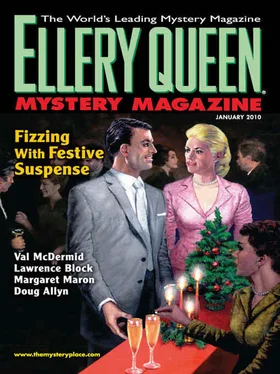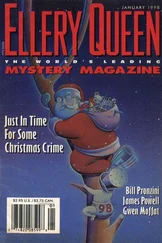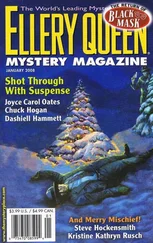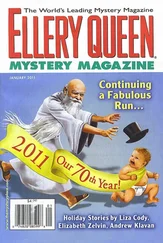Allyn Allyn - Ellery Queen's Mystery Magazine. Vol. 135, No. 1. Whole No. 821, January 2010
Здесь есть возможность читать онлайн «Allyn Allyn - Ellery Queen's Mystery Magazine. Vol. 135, No. 1. Whole No. 821, January 2010» весь текст электронной книги совершенно бесплатно (целиком полную версию без сокращений). В некоторых случаях можно слушать аудио, скачать через торрент в формате fb2 и присутствует краткое содержание. Город: New York, Год выпуска: 2010, Издательство: Dell Magazines, Жанр: Детектив, на английском языке. Описание произведения, (предисловие) а так же отзывы посетителей доступны на портале библиотеки ЛибКат.
- Название:Ellery Queen's Mystery Magazine. Vol. 135, No. 1. Whole No. 821, January 2010
- Автор:
- Издательство:Dell Magazines
- Жанр:
- Год:2010
- Город:New York
- ISBN:нет данных
- Рейтинг книги:5 / 5. Голосов: 1
-
Избранное:Добавить в избранное
- Отзывы:
-
Ваша оценка:
- 100
- 1
- 2
- 3
- 4
- 5
Ellery Queen's Mystery Magazine. Vol. 135, No. 1. Whole No. 821, January 2010: краткое содержание, описание и аннотация
Предлагаем к чтению аннотацию, описание, краткое содержание или предисловие (зависит от того, что написал сам автор книги «Ellery Queen's Mystery Magazine. Vol. 135, No. 1. Whole No. 821, January 2010»). Если вы не нашли необходимую информацию о книге — напишите в комментариях, мы постараемся отыскать её.
Ellery Queen's Mystery Magazine. Vol. 135, No. 1. Whole No. 821, January 2010 — читать онлайн бесплатно полную книгу (весь текст) целиком
Ниже представлен текст книги, разбитый по страницам. Система сохранения места последней прочитанной страницы, позволяет с удобством читать онлайн бесплатно книгу «Ellery Queen's Mystery Magazine. Vol. 135, No. 1. Whole No. 821, January 2010», без необходимости каждый раз заново искать на чём Вы остановились. Поставьте закладку, и сможете в любой момент перейти на страницу, на которой закончили чтение.
Интервал:
Закладка:
Ursula understood why the young, fair-haired woman in gray, dozing in a wing chair, would captivate the crowd. Like the best of Elif’s portraits, she was so very still, suspended within her own world and her own light. One noted Hopper’s influence, and yet the girl’s affect was completely different. “Serene,” said the docents. No, thought Ursula. No one knew what she was, not even the painter. Only the sleeper knew. For such a popular work, it was truly good.
She felt almost content, almost herself again, here in the largest and loftiest of the galleries, lit by high clerestory windows. A week of the child had drained her. She needed a rest.
Ursula began a leisurely tour of the room. What was this, a landscape in the midst of the portraits? She moved nearer, drawn to the misshapen fir tree, to a green at once deep, dark, and cool.
At the top of the tree sat two inky birds. Her eyes traveled downward until she realized the painting wasn’t a true landscape. Reclining against the tree trunk was another young woman. Not the Sleeper, not nearly so blond. Ursula felt the blood beating inside her skull, almost heard its thrum. She made herself walk closer. The model appeared to be sitting in a garden; a high stone wall suggested itself in the background, and massive plants of various sorts, sprigged with small flowers — herbs perhaps. Ursula was about two meters from the painting now. One of the model’s hands rested in her lap, and the other wrapped a root of the tree. Feathery brown hair escaping from its knot, steel-blue eyes gazing upward, just above the viewer’s head. Ursula stooped to read the plaque next to the painting.
Ravensara.
“Ma’am?”
Ursula slowly swiveled her head.
“Where’s the sleeping lady?”
“The sleeping lady?”
The little girl nodded confidently. She had brown eyes, tilted at the corners. Ursula looked at her for a long time before saying, “ Sleeper, she’s called.”
“I saw her on the bus. A poster of her. She’s so pretty.”
“Yes. No. You’re the one who’s pretty. See the bench there, with all the people? She’s just in front of it.”
The girl nodded again, puzzled but pleased, and dashed off. Ursula forgot to follow and admonish her for running in the museum. She returned to Ravensara.
So this was her daughter. It had to be. Who else could it be? A human being’s eyes, her glance, didn’t change, not in three years nor in thirty. She recognized her, knew her, absolutely.
Her daughter. Heavens, she was beautiful. Beautiful — and peaceful, as Ursula herself had never been. She had her youth and health and a garden and art. Ursula blinked. She felt flooded with light, physically drenched with it, as if a window shade had suddenly flown open. So this was joy, the mere knowledge that someone else existed. Almost, she wanted to cry, but that would prevent her looking at Sara.
Inhale while counting to four; hold it on a count of four; exhale on a count of four; hold again for four — what her old yoga teacher called square breathing. Ursula square-breathed conscientiously, several times, before returning to the doorway. She would inch along the wall, like a turtle. In less than an hour, she would have a perfect view of her daughter.
Much later that night, Ursula poured the last of her Christmas cognac. Now she was full of self-loathing. Her daughter? That was a painting. She had no daughter. She wasn’t a mother, she was a fool. With a conscious effort, she grasped the edge of the kitchen table and pulled herself upright.
She hadn’t looked at the family albums since moving to this studio, and couldn’t quite remember where they had got to. Not the bookshelves, not under the bed. The hall closet. She almost fell off the stepstool and had to grab at the clothing rod to save her balance. Ah, there they were, shoved to the very back of the top shelf: two big, leathery volumes full of relatives, collected by her mother, who had hated every one of them.
This time Ursula didn’t scruple to sit on the floor. She leaned against the closet door and pawed through the first album until she succeeded in ripping right through Great-Uncle Karl’s grim face. After that she paged more cautiously past grandparents and great-grandparents, long-dead cousins many times removed, uncles, aunts, Pappa — and Mamma, the old bitch, as a squalling baby, a sullen, uniformed school girl. Ursula stopped turning. Here it was: the yellowing snapshot of her mother taken on holiday just before her marriage, sitting on a stool under a birch tree and gazing into space. The same pose, almost, and the same unfathomable expression, even the same floating hair. Ursula fell asleep then, curled up on the hall carpet, not minding the cold.
No more alcohol, she told herself sternly; there was work to be done. She attached a small lock to the liquor cabinet and tossed the key behind the refrigerator. A long shower and lots of aspirin and coffee and juice, and she was ready for work.
How would she feel on seeing Sara again? Ursula paused on a curb for the red light before darting across the street. For why shouldn’t it be Sara? Elif was only nine or ten years her senior, educated, and as cultured a person as one could wish. He was a countryman, for God’s sake, and it wasn’t that big a country. A nurse probably mentioned the name to the adoption workers. The canvas was dated 1996; the model looked to be the right age. Given those liberal abortion laws, there probably hadn’t been many babies available for adoption. She must look that up. She must look many things up.
Once at her post, she slipped an envelope from her blazer’s inside pocket and boldly stepped right up to the painting. The resemblance between Sara and her own mother was even stronger than she had imagined. Faded though the little snapshot was, the shape of the faces, the high foreheads — these were unmistakable. Fingers trembling, she pulled out and unfolded the one drawing Ralf had made of her, the day they met. Again the shape of the face, and the hands, too. Tall, long-legged women, all three of them, but their hands were small, and shapely as gulls.
Ursula carefully replaced the photograph and the drawing. She glanced around — no authorities in sight. In the small notebook in which she kept track of her work schedule, she began a list: Search the Web for biographical information about Elif and for intelligent criticism about the paintings. Was there an adoptees’ organization in their native country? Very likely. Search “Sara Elif.” Perhaps she, too, was an artist. Look at the university art department’s Web site and see what their library had to offer. They might even be open this evening.
And the paintings themselves; Elif’s self-portrait, a happy contrast to the sober face in the exhibit brochure, might hold a clue. Ursula stopped writing. Daft of her — he wasn’t the biological father. Ralf was. Had she destroyed all her sketches of Ralf?
She had become too engrossed in her task, and the patron had to raise his voice. Where had all these people come from so suddenly? Ursula directed him to the bathroom, barely able to conceal her impatience, for a terrible thought had just occurred to her: When I find her, when I find my daughter, what then?
Ursula had always loved slow mornings at the museum, time during which she could sink into a chosen canvas as she would into sleep. A good painting was good company, and now Ravensara had become her best friend.
“Good morning, my love. How are you today?” she would ask the young woman. It was hard not to whisper the words out loud, but she heard them in her mind, sweet and vibrant.
“Fine, Mamma. I got up early and sketched. I’ve decided to paint the meadow.”
“That’s ambitious! In morning light?”
Читать дальшеИнтервал:
Закладка:
Похожие книги на «Ellery Queen's Mystery Magazine. Vol. 135, No. 1. Whole No. 821, January 2010»
Представляем Вашему вниманию похожие книги на «Ellery Queen's Mystery Magazine. Vol. 135, No. 1. Whole No. 821, January 2010» списком для выбора. Мы отобрали схожую по названию и смыслу литературу в надежде предоставить читателям больше вариантов отыскать новые, интересные, ещё непрочитанные произведения.
Обсуждение, отзывы о книге «Ellery Queen's Mystery Magazine. Vol. 135, No. 1. Whole No. 821, January 2010» и просто собственные мнения читателей. Оставьте ваши комментарии, напишите, что Вы думаете о произведении, его смысле или главных героях. Укажите что конкретно понравилось, а что нет, и почему Вы так считаете.












